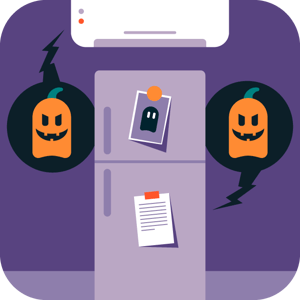Autumn Energy Saving Checklist: Prepare Your Home for Cosy and Cost-Effective Living
During the warmer months, energy saving comes naturally. Not needing to turn the heating on and using the oven less, amongst other things, make energy bills much lower.
But as the darker and colder months approach, we’re quickly reminded of the importance of using less energy. Before the weather gets really chilly and your bills creep up, here are some energy-saving tips to help you prepare!
Wasted energy makes up 30% of the average energy bill - do something about it! Get more from your smart meter with Loop.
Draught-Proof Your Home
Before the chilly winds of autumn set in, it's crucial to ensure your home is properly sealed. Draughts can be a significant source of heat loss. Instead of turning your thermostat up, make sure there aren’t any gaps around your doors, windows, and chimneys - these are the biggest offenders to look out for.
Have you heard of the toilet paper hack? If you don't know where draughts are coming from, simply get a two-ply sheet of toilet paper, remove one layer then hold it around windows and doors to see if it moves. If it does, it means you have a draught to seal. Knowing where draughts are coming from will help you prioritise your efforts!
Top tip: Get kids involved with energy-saving by doing some draught crafts! The BBC has a great step-by-step guide here to make a draught excluder snake that will stop the cold air “hissing” under your doors.
Improve Your Insulation
Whilst you’re hunting out for areas in your home to draught-proof, pop your head in the loft to check it has the recommended 27cm of insulation. If it doesn’t, you can top it up yourself or pay a professional to do it for you.

Lower Your Boiler Flow Temperature
If you have a combi boiler, reducing the flow temperature can help you save energy without sacrificing comfort. This is the temperature your boiler sends water to your radiators.
Lowering this means your boiler will be more efficient as it will be in condensing mode - where it recovers heat that would otherwise be lost. Whilst most are set to send water at 80 degrees, this is much higher than it needs to be as they can work just as well at 60 degrees.
It’s an effortless action that can lead to big savings - up to 12% on your gas bill just by one simple setting change! However, bear in mind that this is not suitable for all types of boilers. Check out the excellent Money Saving Boiler Challenge site here for full instructions.
Bleed Your Radiators
Every now and then, radiators need some TLC to keep working efficiently as over time air can become trapped within them. You can often tell if your radiators need bleeding if they are cold at the top, but hot at the bottom.
Bleeding radiators may seem like a big job, but it can be pretty quick! The best time to do it is just before you turn on your central heating for Winter, then you can enjoy their full heat output all winter long!
Whilst you’re there, give them a dust and move furniture from blocking them. Even small actions like this go a long way to help your home become as efficient as possible!
Turn Off Summer Appliances
As we transition into autumn, it's time to bid farewell to energy-hungry summer appliances like air conditioners and fans. Be sure to turn them off and unplug them when not in use to prevent unnecessary energy consumption throughout the year.
We call this your ‘Phantom Load’ and if you don’t have a grip on it, you’re needlessly spending money on wasted energy - it makes up around 30% of the average electricity bill!
Before you can reduce your Phantom Load, you need to identify which things are using the most power to see where savings can be made. That’s where the free Loop app can help.

Could you heat the human, not the home?
Layering up with jumpers, blankets, and Winter duvets during this in-between weather is a great way to keep warm while avoiding a high heating bill.
However, it is important to stay comfortable, and the government recommends turning the heating on when the temperature falls below 15 degrees outside. This is especially important if you have any illnesses that are impacted by the cold.
Having an efficient heating schedule can really help to stay on top of heating costs. Simple actions like switching off radiators in unused rooms, turning the thermostat down, and getting your heating schedule right can all contribute to big savings.
• • •
Cut Your Energy Bill With Loop
Loop is a FREE energy-saving app that links to your smart meter, analyses your energy use and shows you easy ways to save. On average, Loop users cut their energy use by 15%! How much could you save?








